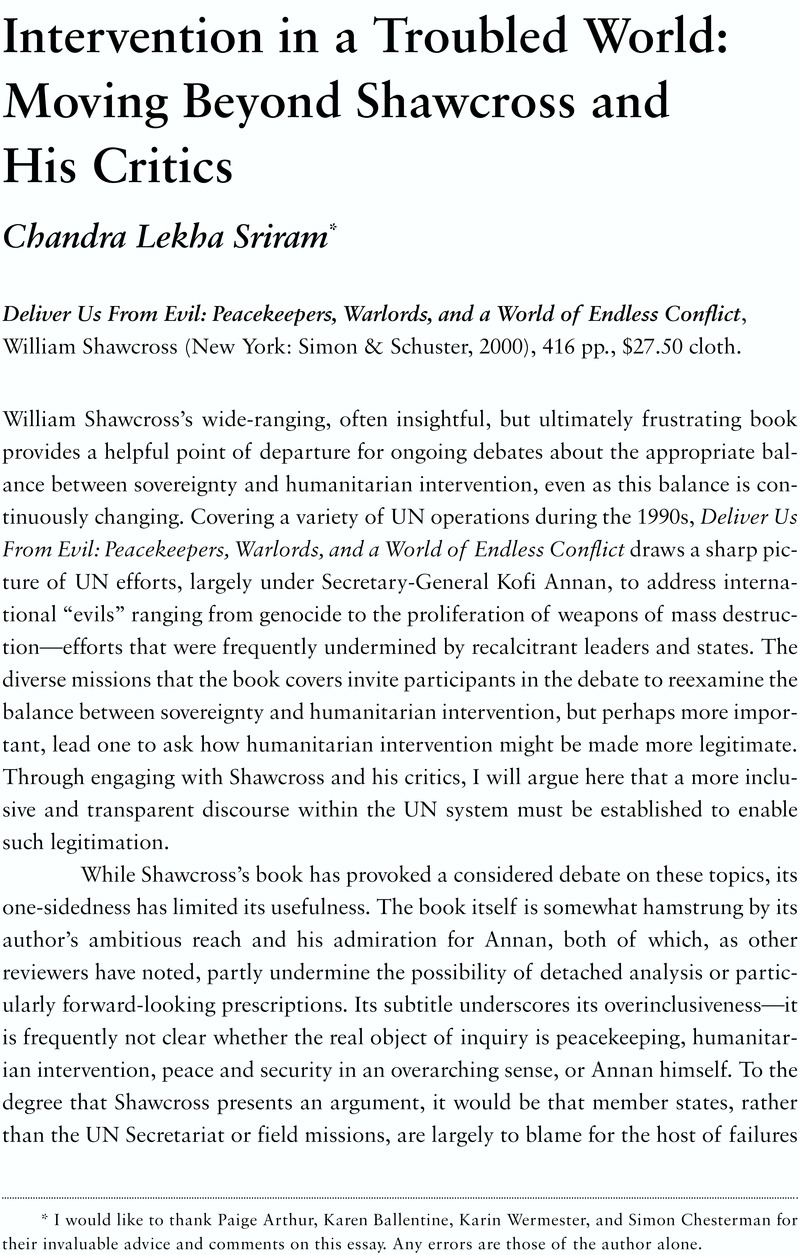No CrossRef data available.
Article contents
Intervention in a Troubled World: Moving Beyond Shawcross and His Critics
Published online by Cambridge University Press: 28 September 2012
Abstract

- Type
- Review Essays
- Information
- Copyright
- Copyright © Carnegie Council for Ethics in International Affairs 2001
References
1 David Rieff, “Nothing Was Delivered,”The New Republic (May 1, 2000), pp. 26–33; and Brian Urquhart, “In the Name of Humanity,”The New York Review of Books (April 27, 2000). David Malone, “Give Peacekeepers a Chance,”Globe and Mail (May 20, 2000), p. D14, admires much about the book while recognizing that it is somewhat short on conclusions.Google Scholar
2 Annan's desire to expand the scope of such intervention was articulated in a speech to the General Assembly in September 1999, which drew some very strong objections—see UN Document GA/9596 (September 20, 1999); also see Claude Bruderlein and Judy Stone, “Sovereignty vs. Humanitarian Intervention: Searching for Common Grounds”{paper presented at the Pugwash Workshop, “Intervention, Sovereignty, and International Security,” Venice, December 9–11, 1999}Google Scholar.
3 Report of the Independent Inquiry into the Actions of the United Nations during the 1994 Genocide in Rwanda (December 15, 1999), available at http://www.un.org/News/ossg/rwanda_report.htm and Report of the Secretary-General pursuant to General Assembly Resolution 53/35: The Fall of Srebrenica, UN Doc. A/54/49 (November 15, 1999).Google Scholar
4 This continuing importance of states and the need to come to terms with them even while attempting to advance more global action is cogently dealt with in Luck, Edward C., “The Enforcement of Humanitarian Norms and the Politics of Ambivalence,” in Chesterman, Simon, ed., Civilians in War (Boulder, Colo.: Lynne Rienner Publishers, 2001)Google Scholar, generally, and especially pp. 205–11.
5 Report of the Panel on UN Peace Operations: A Far-reaching Report by an Independent Panel, available at http://www.un.org/peace/reports/peace_operations/docs and Report of the Secretary-General on the Implementation of the Report of the Panel on United Nations Peace Operations, UN Doc. A/55/502 (October 20, 2000)Google Scholar.
6 Report of the Panel on UN Peace Operations, p. 2; this is almost a throwaway line that does not suggest that such manipulation, and the open acknowledgment of it, might be problematicGoogle Scholar.
7 Independent International Commission Kosovo, on, The Kosovo Report: Conflict—International Response—Lessons Learned (New York: Oxford University Press, 2000), also available at http://www.kosovocommission.org/reportsGoogle Scholar.
8 Ibid., p. 10Google Scholar.
9 See Chesterman, Simon, Just War or Just Peace? Humanitarian Intervention and International Law (Oxford: Oxford University Press, 2001Google Scholar), especially pp. 226–32.
10 Michael, Walzer, “The Moral Standing of States: A Response to Four Critics,” in Beitz, Charles et al. , eds., International Ethics (Princeton: Princeton University Press, 1985), pp. 217–37Google Scholar.
11 Luban, David, “Just War and Human Rights,” in Beitz et al, International Ethics, pp. 195–216Google Scholar, 238–243.


